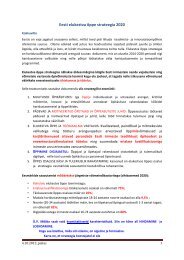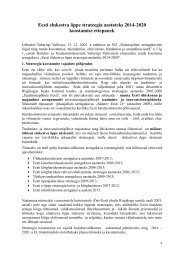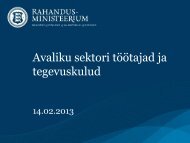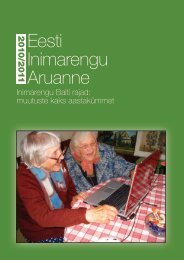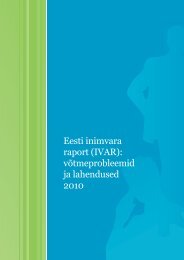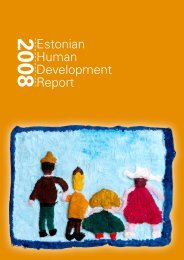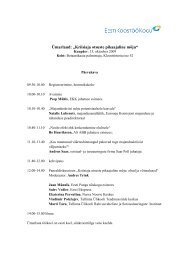DEVELOPMENT
The pdf-version - Eesti Koostöö Kogu
The pdf-version - Eesti Koostöö Kogu
You also want an ePaper? Increase the reach of your titles
YUMPU automatically turns print PDFs into web optimized ePapers that Google loves.
Estonia has always received a low assessment in The<br />
Economist’s index, and has even demonstrated a slight<br />
downward trend in the years under observation. Of<br />
the four indices included here, this is the one that<br />
most clearly highlights some of the possible problems<br />
in Estonia’s democracy. Estonia’s result in 2011 was<br />
7.61 points, which places us in 34 th place among 167<br />
states, and in the category of flawed democracies. If<br />
we examine the sub-components of the index, we see<br />
that the main reason for Estonia’s low rating is its poor<br />
result in the political participation category, in which<br />
Estonia was given a rating of only five points out of<br />
ten. The given category assesses the level of electoral<br />
participation, autonomy and involvement of minorities,<br />
percentage of women in parliament, membership in<br />
political parties and political organisations, the citizenry’s<br />
interest in politics, readiness to participate in<br />
demonstrations, level of adult literacy, monitoring of<br />
politics in the media, and the promotion of political<br />
participation by the authorities. Other studies, like the<br />
World Values Survey, have been used to assess many of<br />
these elements. However, it is important to note that,<br />
since The Economist does not publish the non-aggregated<br />
data of its index, without recreating the assessment<br />
process ourselves, it is impossible to surmise<br />
what the reasons are for the evaluations given to the<br />
various points. Table 2.2.3 shows the assessments for<br />
the five main dimensions of the index for Estonia, as<br />
well as the other reference states of this report.<br />
From the comparison with the other states, we<br />
can see that some of the results put Estonia at the<br />
same level as the full democracies (a total score of more<br />
than 8 points), but in some dimensions, it lags behind<br />
significantly. In the strongest dimension – elections<br />
– Estonia gets the same amount of points as the full<br />
democracies, but this dimension does not differentiate<br />
Estonia, very much, from the other states. Almost all<br />
the reference states get approximately the same number<br />
of points (between 9.17 and 10), with the only exception<br />
being Singapore (4.33 points). But elections do not<br />
Table 2.2.2<br />
Assessments of Estonia’s democracy from a comparative<br />
perspective<br />
Freedom in the<br />
World<br />
Estonia<br />
Central and<br />
Eastern<br />
Europe 1<br />
(average)<br />
Former<br />
Soviet<br />
Union 2<br />
(average)<br />
1 100% 1,86 85,7% 5,21 29,8%<br />
Nations in Transit 1,93 84,5% 3,04 49,3% 5,99 16,8%<br />
Economist 7,61 76,1% 6,78 67,8% 3,74 37,4%<br />
Polity IV 3 9 95% 9,17 98,5% -0,41 47,95%<br />
Source: see the data of the given indices on the Internet<br />
1 Albania, Bosnia ja Herzegovina, Bulgaria, Croatia, Latvia,<br />
Lithuania, Macedonia, Montenegro, Poland, Serbia, Slovakia,<br />
Slovenia, Czech Republic, Hungary. 2 Except for the Baltic states.<br />
3 Bosnia ja Herzegovina and Montenegro are missing from<br />
the Central and Eastern European states.<br />
Table 2.2.3<br />
Estonia’s position in the context of the reference countries<br />
(The Economist’s index 2011)<br />
TOTAL<br />
Elections<br />
Source: http://www.eiu.com/public/thankyou_download.<br />
aspx?activity=download&campaignid=DemocracyIndex2011<br />
Governance<br />
Participation<br />
Political<br />
culture<br />
Denmark 9,52 10 9,64 8,89 9,38 9,71<br />
New Zealand 9,26 10 9,2 8,89 8,13 10<br />
Switzerland 9,09 9,58 9,29 7,78 9,38 9,41<br />
Finland 9,06 10 9,64 7,22 8,75 9,71<br />
Austria 8,49 9,58 7,86 7,78 8,13 9,12<br />
Czech Republic 8,19 9,58 7,14 6,67 8,13 9,41<br />
Uruguay 8,17 10 8,93 4,44 7,5 10<br />
Costa Rica 8,1 9,58 8,21 6,11 6,88 9,71<br />
South Korea 8,06 9,17 7,86 7,22 7,5 8,53<br />
Slovenia 7,76 9,58 7,5 6,67 6,25 8,82<br />
Estonia 7,61 9,58 7,14 5 7,5 8,82<br />
Chile 7,54 9,58 8,57 3,89 6,25 9,41<br />
Taiwan 7,46 9,58 7,14 5,56 5,63 9,41<br />
Slovakia 7,35 9,58 7,5 5,56 5 9,12<br />
Singapore 5,89 4,33 7,5 2,78 7,5 7,35<br />
suffice for the existence of democracy. Free and fair<br />
elections must exist, as well as, for instance, a government<br />
that functions in accordance with democratic<br />
values (including transparency and the lack of corruption).<br />
And the citizenry must perceive this (trust the<br />
government and the political parties). This is measured<br />
by the second yardstick in The Economist’s index. In<br />
this regard, Estonia, with 7.14 points, lags significantly<br />
behind the states under observation, and shares the<br />
lowest result with Taiwan and the Czech Republic.<br />
Therefore, it can be stated that to increase the minimal<br />
functioning of democracy, Estonia needs to improve<br />
the quality of governance and the functioning of the<br />
government.<br />
As far as the remaining three dimensions are<br />
concerned – participation, political culture and civil<br />
liberties – Estonia’s results in the dimension of civil<br />
liberties are the only ones comparable to the full<br />
democracies, although here, as in the case of the<br />
electoral dimension, all the states under observation<br />
get relatively high marks. Therefore, Estonia does not<br />
differ, substantially, from the other states. Estonia gets<br />
significantly lower results, than the full democracies, in<br />
the participation and political culture dimensions – 5<br />
and 7.50 points, respectively. If we compare Estonia to<br />
the reference states, from this aspect, one can say that<br />
in the democracy dimensions, in which Estonia is in<br />
the best position (i.e. elections and civil liberties), it<br />
does not differ substantially from the states that are<br />
significantly more democratic, or those that are less<br />
democratic. However, in the dimensions where Estonia<br />
Civil liberties<br />
70<br />
Estonian Human Development Report 2012/2013



